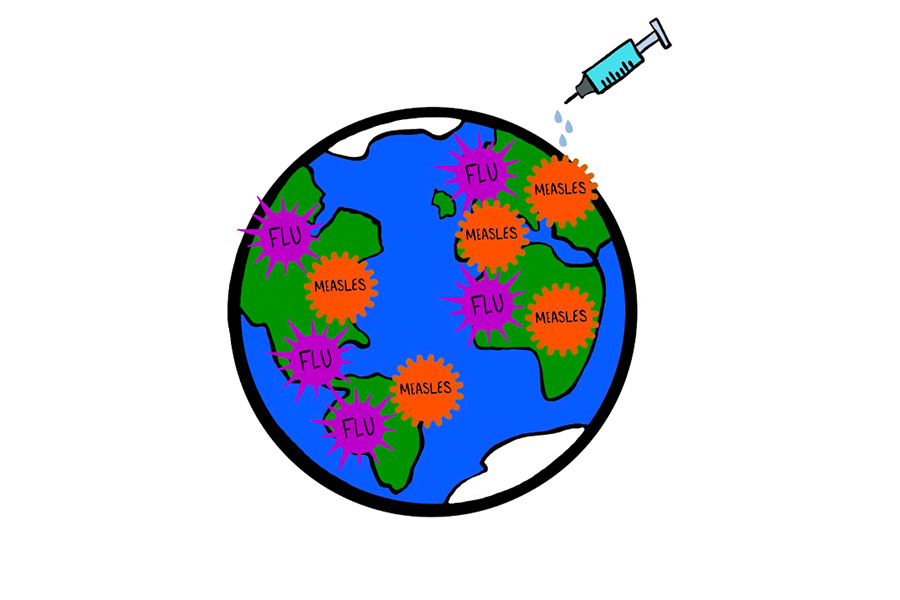It’s never too late to vaccinate
There has been a recent spike in the rate of unvaccinated people contributing to the return of previously considered eradicated diseases such as measles. The Sidekick staff writer Jillian Moore argues the importance of getting vaccinations and avoiding false information regarding them.
January 16, 2020
“They have turned our children into the largest human experiment in history — all of history,” Del Bigtree, CEO of anti-vaccination group Informed Consent Action Network, says as supporters of the anti-vaccination movement nod their heads in agreement during a New York rally.
Mumps, rubella, pertussis (whooping cough), poliomyelitis (polio) and measles represent a small sampling of the many diseases with the potential to be prevented by vaccines. However, safety concerns, medical skeptics and personal beliefs are leading many to opt out of vaccinations, creating a public safety concern and national movement.
Vaccines in the general population have eradicated disease such as smallpox and came close to eradicating malaria and polio. However, recent opposition to vaccinations, specifically the measles, mumps and rubella (MMR) vaccine, has led to outbreaks of diseases such as measles, which was previously considered eradicated in the Western Hemisphere. The decrease in the number of vaccinations poses a new health concern and increases the risk that other previously eradicated diseases will return.
Recent outbreaks of measles in five U.S. cities call for a change in the public mentality towards vaccinations. Los Angeles, Chicago, Denver, Austin and Richmond all reported individuals infected with measles had traveled through their airports.
“With so many people refusing to get vaccinated, diseases that previously had a small number of cases are now growing and becoming more dangerous, putting me and other teens at risk,” Coppell High School sophomore Sophie Royer said.
Many opposed to vaccination fear the shots could cause autism. This theory was proposed by British surgeon Andrew Wakefield but has since been disproved through various studies conducted by organizations such as the Center for Disease Control. These studies concluded that autism develops before a child is old enough to receive vaccines.
“Many of the worries of parents who chose not to [have their kids] vaccinated are not supported by research,” CHS9 health science teacher Bill Borowski said. “Whereas the benefits of herd immunity (if a large percentage of the population becomes immune to diseases through vaccination, it protects those who are not vaccinated as well) are well documented.”
Death by contracting measles is a 1 in 500 chance of death. Comparatively, the chance of having a severe allergic reaction to vaccines is only 1.3 per every 1 million. Worldwide, vaccines prevent and estimated 2.5 million deaths each year.
Although some states allow minors to get certain vaccinations, Texas has a straightforward stance that only individuals over the age of 18 can get vaccinations without a parent or guardians consent.
In order to enroll in a public school in Texas, students are required to be vaccinated against nine different diseases. However, exemptions can be given to those with medical conditions or conscientious reasons including religious belief or personal belief. In some Texas counties, conscientious exemptions for reasons such as personal opposition to vaccinations have doubled in some counties.
Herd mentality provides immunity for people unable to receive vaccines by ensuring immunity by the general population. However, this approach to immunity only works when 96-99% of the population is vaccinated. With more individuals requesting an exemption from immunization requirements, individuals with compromised immunity or religious beliefs preventing immunization are no longer protected by herd mentality.
Some in support of the anti-vaccination movement have taken this position after personal experience with negative reactions to vaccinations. After his son experienced severe reactions to a vaccination at 3 months old, CHS health science teacher Dr. Trace Grisso supports anti-vaccination until a child is 5.
“It would be beneficial after five years just because before that, your system is not developed and ready for vaccines,” Grisso said. “It’s like buying your kid shoes when they can’t yet walk; it really doesn’t do you any good but it doesn’t necessarily hurt.”
The abundant evidence showing the positive effects of vaccines needs to be spread so more people can make educated decisions to ensure the safety of their children, as well as other people in society.
“Most of the claims [about vaccinations] are unfounded and we need to educate [parents] in the far greater risk of not vaccinating their children, according to the current state of research on the topic,” Borowski said.
Follow Jillian (@jillianmoore_) and @CHSCampusNews on Twitter.













Laasya Achanta • Jan 17, 2020 at 2:08 pm
This story is so well written, good job!